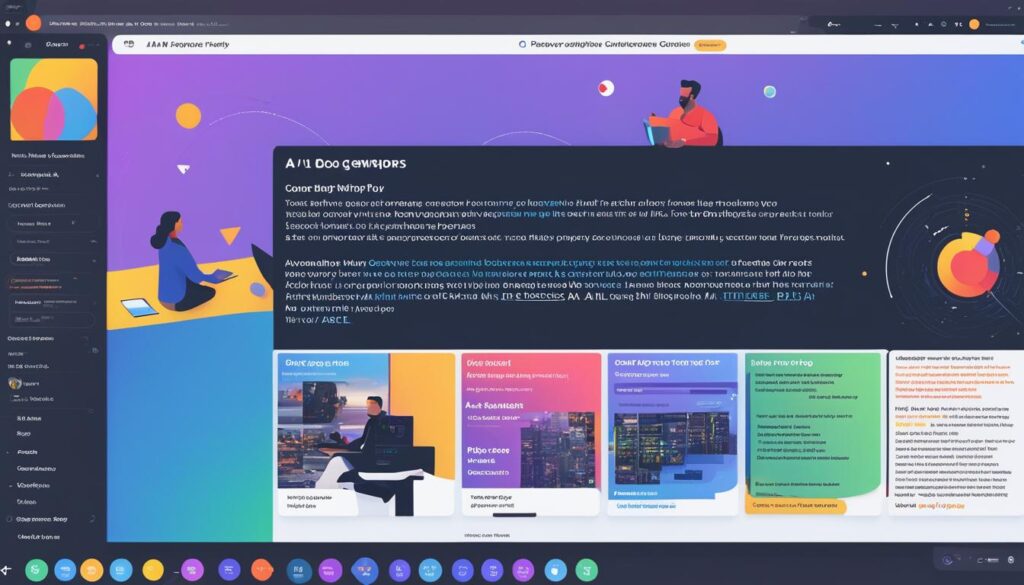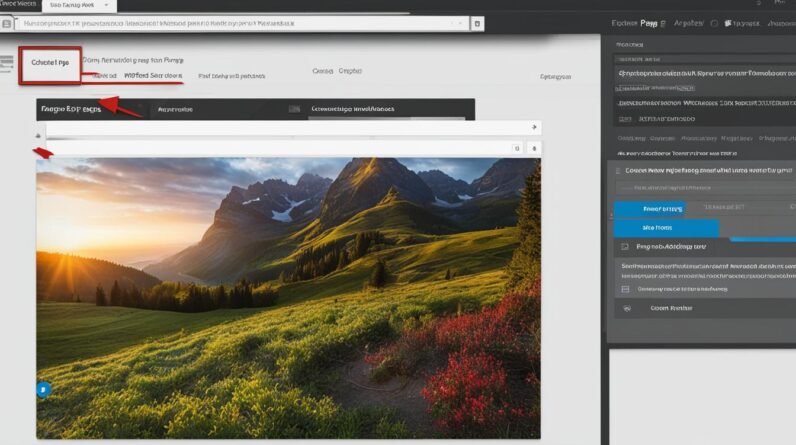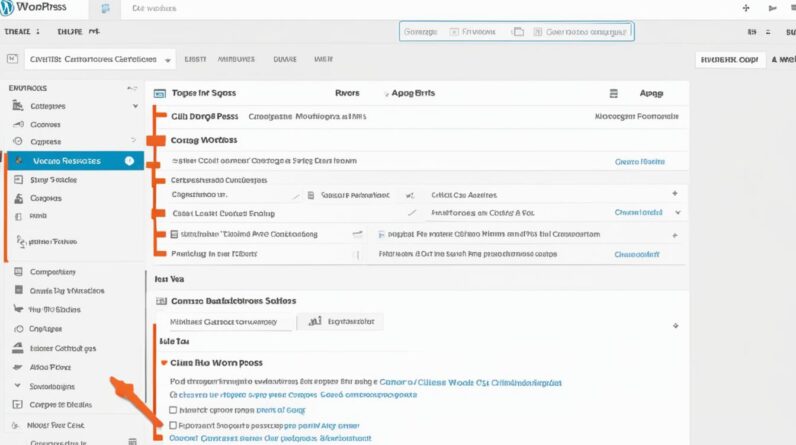Hello there! Are you looking to improve your WordPress blog’s visibility on search engines? One of the key strategies for achieving this is by adding relevant keywords to your content. In this article, I will guide you through the process of adding keywords in WordPress and share some best practices to optimize your website’s SEO.
How to Make Money with YouTube
Create an empire of automated video websites for multiple streams of income
Key Takeaways:
- Adding keywords to your WordPress content is essential for optimizing your blog’s SEO.
- Using SEO plugins like All in One SEO or Yoast SEO can simplify the process of adding keywords.
- Optimize your meta descriptions and include relevant keywords to improve click-through rates and search engine rankings.
- Keyword research plays a vital role in identifying the right keywords to target for your content.
- Follow best practices for keyword usage, including natural placement and avoiding keyword stuffing.
Why Are Meta Keywords and Descriptions Important for SEO?
Meta keywords and descriptions are crucial components for enhancing your website’s SEO rankings. These HTML meta tags provide valuable information to search engines about the content of your posts and pages. While meta keywords may not hold substantial importance for most search engines, meta descriptions are widely utilized and can significantly impact your click-through rate and search engine rankings.
When a user conducts a search on Google or other search engines, the search results display the page title, URL, and meta description. The meta description acts as a concise summary of the content, highlighting the most relevant information. By crafting an informative and persuasive meta description, you can attract more users to click on your link, leading to increased organic traffic to your website.
Meta keywords, on the other hand, were previously used by search engines to understand the content of a webpage. However, due to abuse and the evolution of search algorithms, their importance has diminished over time. Most search engines now prioritize the actual content of your posts and pages when determining search rankings. Therefore, it’s more crucial to focus on incorporating relevant keywords organically into your content rather than solely relying on meta keywords.
Despite the changing landscape, meta keywords and descriptions still play a role in influencing search engine rankings. Properly optimized meta descriptions can improve your website’s visibility in search results and entice users to click on your links. This, in turn, can lead to higher traffic and engagement on your site, ultimately boosting your SEO rankings.
The Importance of Meta Descriptions
Meta descriptions serve as a concise summary of your content and are displayed below your page title in search results. Crafting well-written and informative meta descriptions can not only improve your click-through rate but also impact your search engine rankings. Here are a few reasons why meta descriptions are important for SEO:
- Improved Click-Through Rate: A compelling meta description that accurately reflects the content of your page can entice users to click on your link, increasing your click-through rate. The higher your click-through rate, the more likely search engines will see your page as relevant and valuable to users, potentially boosting your rankings.
- Enhanced User Experience: A well-crafted meta description provides users with a clear understanding of what they can expect from your page. When users find the information they need quickly and easily, they are more likely to engage with your content and potentially convert into loyal visitors or customers.
- Targeted Keywords: Incorporating relevant keywords into your meta description can help search engines understand the context of your content and improve the relevancy of your page for specific search queries. By aligning your meta description with the user’s search intent, you increase the chances of your page ranking higher in search results.
Considering the importance of meta descriptions for SEO, it’s essential to optimize them for every post and page on your website. Craft compelling, concise, and keyword-rich meta descriptions that accurately reflect your content and encourage users to click on your links.
Meta Keywords and their Changing Significance
While meta keywords may not hold significant importance for most search engines, it’s still worth considering their role in optimizing your website’s SEO. Meta keywords were once widely used to indicate the main topics or keywords of a webpage. However, due to past abuse and attempts to manipulate search rankings, search engines have adjusted their algorithms to prioritize the actual content of the page over meta keywords. This shift has rendered meta keywords less influential in determining search rankings.
Nonetheless, meta keywords can still provide some value when used appropriately. Here are a few reasons why meta keywords may still be relevant for your SEO efforts:
- Clarifying the Content: Including relevant meta keywords can provide additional context about the content of your page and help search engines understand the topics and themes covered. This can be particularly useful for websites with numerous pages or complex content structures.
- Internal Site Search: Some internal site search engines may utilize meta keywords to enhance their search results. By properly tagging your pages with relevant meta keywords, you can improve the accuracy and relevance of internal search results on your website.
- Content Categorization: Meta keywords can help categorize your content for organizational purposes, providing users with an intuitive way to navigate and find the information they need within your website.
While meta keywords may not have a significant impact on your search engine rankings, it’s still a good practice to include them when appropriate. By selecting relevant and accurate meta keywords, you can provide helpful information to search engines and enhance the overall user experience on your website.
Incorporating Meta Keywords and Descriptions with SEO Plugins
Adding meta keywords and descriptions to your WordPress posts and pages can be made easier with the help of SEO plugins. These plugins provide user-friendly interfaces and features dedicated to optimizing on-page elements for better SEO performance.
| SEO Plugin | Key Features |
|---|---|
| All in One SEO |
|
| Yoast SEO |
|
These plugins offer intuitive interfaces that enable you to easily add and manage meta keywords and descriptions for your WordPress content. By utilizing SEO plugins, you can streamline your optimization process and ensure that your meta tags are effectively optimized for search engines, improving your chances of higher rankings and increased organic traffic.
How to Install and Activate an SEO Plugin for WordPress
Installing and activating an SEO plugin is essential for optimizing your WordPress website. Two popular plugins for this purpose are All in One SEO and Yoast SEO. These plugins offer a wide range of tools to enhance your site’s SEO performance. Follow these steps to install and activate an SEO plugin:
- Access your WordPress admin area.
- Navigate to the Plugins section.
- Click on the “Add New” button.
- In the search bar, type the name of the desired plugin (e.g., All in One SEO or Yoast SEO).
- Look for the plugin in the search results and click on the “Install Now” button.
- After installation, click on the “Activate” button to activate the plugin.
Once installed and activated, you can access the plugin’s settings in your WordPress admin area. These settings allow you to configure various aspects of your SEO strategy, such as adding keywords and meta descriptions to your posts and pages, optimizing your site structure, generating XML sitemaps, and much more.
Installing and activating an SEO plugin is a crucial step towards improving your website’s SEO performance. With the right plugin and proper configuration, you’ll have the necessary tools to optimize your content and boost your site’s visibility in search engine results.
“Installing and activating an SEO plugin is essential for optimizing your WordPress website.”
Adding Keywords and Meta Descriptions to Your WordPress Posts and Pages
Adding keywords and meta descriptions to your WordPress posts and pages is an essential part of optimizing your content for search engines. By strategically incorporating relevant keywords and creating compelling meta descriptions, you can improve your website’s visibility and attract more organic traffic. Fortunately, this process is straightforward with the use of SEO plugins like Yoast SEO or All in One SEO.
To begin, open the desired post or page in the WordPress editor. Scroll down to the SEO section provided by your SEO plugin. If you’re using Yoast SEO, you’ll find this section labeled as “Yoast SEO” underneath the post editor. For All in One SEO, it will be located within the “All in One SEO Pack” meta box.
Once you’ve located the SEO section, you can add your target keyword and meta description. The keyword should accurately reflect the content of your post or page and align with your keyword optimization strategy. The meta description, on the other hand, should be a concise and compelling summary that entices users to click on your link in the search results.
It’s important to optimize your content by including the target keyword in key areas such as headings, titles, and throughout the body copy. This helps search engines understand the relevance of your content and improves your chances of ranking higher in search results.
After adding the keyword and meta description, save or update your post or page to apply the changes. It’s a good practice to regularly review and update your keywords and meta descriptions as needed, especially when you make substantial changes to your content.
Adding keywords and meta descriptions to your WordPress posts and pages is a powerful technique for increasing your website’s visibility and attracting targeted traffic. By leveraging the features of popular SEO plugins like Yoast SEO or All in One SEO, you can easily optimize your content for better search engine rankings and enjoy the benefits of improved organic traffic.
In the next section, we will explore the process of optimizing meta keywords and descriptions for your WordPress homepage.
Optimizing Keywords and Meta Descriptions for Your Homepage
Your WordPress homepage is a crucial component of your website’s search appearance. To ensure maximum visibility and improved search engine rankings, it’s important to optimize your homepage with relevant meta keywords and a compelling meta description.
To optimize your homepage, access the search appearance section in your chosen SEO plugin settings. If you’re using All in One SEO or Yoast SEO, you can easily make these optimizations.
In the search appearance section, you’ll find fields specifically designed for meta keywords and meta descriptions. Take the time to fill in these fields with keywords that accurately describe the content and purpose of your homepage.
When selecting meta keywords, choose relevant terms that align with your website’s overall focus and target keywords. These keywords should provide valuable insights to search engines about your business, products, or services.
Similarly, crafting an attention-grabbing meta description is essential. The meta description is displayed in search engine results, influencing whether users click through to your site or not. Therefore, it’s important to write a concise and compelling description that accurately represents your homepage and entices users to visit.
Remember, both meta keywords and meta descriptions play a significant role in improving your website’s search appearance and SEO rankings. Save your changes after optimizing these fields, and give search engines some time to crawl and index your updated metadata.
In addition to optimizing your homepage, be sure to apply keyword and meta description optimization techniques to all important pages and posts on your WordPress website. Consistent optimization across your site’s content will improve its visibility and attract more organic traffic.
Enabling Meta Keyword Support in All in One SEO
By default, All in One SEO has meta keyword support disabled. However, enabling this feature can enhance your SEO efforts and improve your website’s search appearance. Here’s how to enable meta keyword support:
- Access your WordPress dashboard.
- Navigate to All in One SEO from the menu.
- Scroll down and find the “Search Appearance” section.
- Look for the option to enable meta keywords and toggle it to “Yes”.
- Save the changes to apply the meta keyword support.
With meta keyword support enabled, you can now define meta keywords for each post and page individually. This enables search engines to better understand the content of your website and improve your SEO rankings. Alternatively, you can generate meta keywords automatically based on categories or tags assigned to your posts and pages.
Let’s take a closer look at how to define meta keywords for individual posts and pages:
- Open the desired post or page in the WordPress editor.
- Navigate to the SEO section provided by All in One SEO.
- Locate the meta keywords field and add relevant keywords related to your content.
- Save or update your post/page to apply the changes.
Remember to choose keywords that accurately describe the content of your post or page. Using strategic and targeted meta keywords can greatly contribute to your overall SEO strategy and improve your website’s visibility in search engine results.
Enabling Meta Keyword Support in All in One SEO
| Steps | Description |
|---|---|
| 1. | Access your WordPress dashboard. |
| 2. | Navigate to All in One SEO from the menu. |
| 3. | Scroll down and find the “Search Appearance” section. |
| 4. | Look for the option to enable meta keywords and toggle it to “Yes”. |
| 5. | Save the changes to apply the meta keyword support. |
Using Dynamic Tags and AI-powered Title/Description Generator
Some SEO plugins, such as All in One SEO, offer dynamic tags functionality and an AI-powered Title/Description Generator. These features provide effective ways to enhance your meta descriptions and optimize your content. Let’s take a closer look at each of these innovative tools:
Dynamic Tags
Dynamic tags allow you to add dynamic variables to your meta description, providing a more personalized and engaging experience for your audience. By incorporating these tags, you can dynamically generate content based on the author’s name, the current year, or other relevant information.
For example, consider using the dynamic author’s name tag to create a unique meta description for each blog post:
Discover the latest SEO strategies for 2022 with expert insights from John Doe, a seasoned digital marketing professional.
This allows you to create a sense of authority and credibility, increasing the chances of attracting clicks from search engine results pages.
AI-powered Title/Description Generator
In addition to dynamic tags, AI-powered Title/Description Generators can revolutionize your approach to crafting compelling meta descriptions. These sophisticated tools, leveraging the power of AI algorithms like ChatGPT, automatically generate high-quality meta description suggestions based on your content.
With the AI-powered generator at your disposal, you can significantly reduce the time and effort spent on creating catchy and SEO-friendly meta descriptions. Simply input your content, review the generated suggestions, and select the most suitable one for your post or page.
For example, here’s a generated meta description for an article on WordPress keyword optimization:
Discover the best practices for optimizing keywords in WordPress and boost your SEO rankings with expert tips. Unlock your website’s full potential with our comprehensive guide to keyword strategy in WordPress.
You can then customize and fine-tune the generated meta description to align with your specific goals and target keywords, ensuring maximum effectiveness.

By leveraging dynamic tags and AI-powered Title/Description Generators, you can revolutionize your meta descriptions and enhance your SEO efforts. These innovative features enable you to create personalized and engaging meta descriptions that attract more clicks and improve your search engine rankings.
Best Practices for Keyword Usage in WordPress
When it comes to using keywords in your WordPress content, following best practices is essential for effective search engine optimization. By understanding the right techniques, you can improve your website’s visibility and attract more organic traffic. Let’s explore some key best practices for keyword usage in WordPress:
Avoid Keyword Stuffing
Keyword stuffing, which refers to excessively using keywords in your content, can lead to penalties from search engines. Instead of overloading your content with keywords, focus on providing valuable and relevant information to your readers. This approach ensures a natural flow and engages your audience without compromising your website’s SEO.
Embrace Natural Keyword Placement
When incorporating keywords into your content, prioritize natural keyword placement. It’s important to seamlessly integrate keywords into sentences and paragraphs, making them appear relevant and genuine. By maintaining a natural flow, you can enhance user experience while optimizing your content for search engines.
Incorporate Keyword Variations
Using variations of your target keyword throughout your content is another effective strategy. This not only helps you rank for different search terms but also adds diversity to your content. By employing keyword variations, you can cater to a broader range of user search queries and increase the chances of attracting relevant traffic to your WordPress site.
Aim for a Balanced Keyword Density
Keyword density, referring to the percentage of times a keyword appears in your content, should be balanced. Aim for a keyword density of around 1-2% to maintain a healthy ratio. This ensures that your content remains readable and avoids the risk of keyword stuffing. By striking the right balance, you can optimize your content without compromising its quality.
To provide a visual example that complements this section, here’s an image showcasing the importance of natural keyword placement:
By following these best practices for keyword usage in WordPress, you can optimize your content effectively for improved SEO. Remember, it’s crucial to prioritize user experience and provide valuable content that resonates with your target audience. Let your keywords enhance your content without overpowering it, and watch your WordPress site climb the search engine rankings.
The Importance of Keyword Research in WordPress
Keyword research forms an integral part of optimizing your WordPress content. Conducting thorough keyword analysis allows you to identify the specific keywords and search terms that your target audience is using. This knowledge is crucial for crafting an effective SEO strategy and maximizing the visibility of your website.
One of the key benefits of keyword research is gaining insight into the language and search behavior of your target audience. By understanding the specific words and phrases they use when searching for information or products related to your niche, you can tailor your content to better meet their needs.
There are several keyword tools available that can assist you in this process. Google Keyword Planner, SEMrush, and Ahrefs are popular choices that provide comprehensive keyword data, including search volumes and competition levels. By utilizing these tools, you can discover relevant keywords with a good balance of search volume and competition.
When selecting keywords for optimization, it is important to consider both their relevance to your content and their difficulty rating. The relevance ensures that your content aligns with what your audience is searching for, while the difficulty rating helps you assess the competition you will face in ranking for those keywords. Striking a balance between relevance and difficulty is essential for targeting keywords that have the potential to drive valuable organic traffic to your WordPress site.
The Benefits of Keyword Research in WordPress:
- Identify the specific keywords and search terms used by your target audience
- Optimize your content to meet the needs of your audience
- Discover relevant keywords with a good balance of search volume and competition
- Select keywords that have the potential to drive valuable organic traffic
Example of Keyword Research Tools:
| Keyword Research Tool | Description |
|---|---|
| Google Keyword Planner | A free tool provided by Google that offers insights into search volumes and keyword suggestions. |
| SEMrush | A comprehensive SEO tool that provides keyword research data, competitor analysis, and more. |
| Ahrefs | An all-in-one SEO tool that offers keyword analysis, backlink analysis, and site auditing features. |
By incorporating keyword research into your SEO strategy, you can optimize your WordPress content effectively and increase the visibility of your website among your target audience.
Tips for Effective Keyword Optimization in WordPress
To optimize your keywords in WordPress, follow these tips:
- Place your target keyword in the title, URL, meta description, and headings.
- Use header tags to structure your content and include keywords in them. This helps search engines understand the hierarchy and relevance of your content.
- Add relevant and descriptive alt text to images using keywords when appropriate. This not only improves accessibility but also provides additional keyword context to search engines.
- Incorporate your keyword naturally throughout the body copy without overstuffing. Aim for a keyword density of 1-2% to maintain a good balance.
- Use variations of your keyword to enrich your content and improve SEO. This helps you target a wider range of search queries and capture more organic traffic.
Conclusion
Optimizing your website for search engines is essential for driving organic traffic and increasing your online visibility. By incorporating keyword optimization and meta descriptions in your WordPress site, you can improve your SEO rankings and attract more targeted visitors.
To effectively add keywords and meta descriptions, utilize SEO plugins such as All in One SEO and Yoast SEO. These plugins provide comprehensive tools and settings to optimize your content. Remember to conduct thorough keyword research to identify relevant keywords that align with your target audience’s search behavior.
Strategically place your keywords in your titles, headings, meta descriptions, and body copy. Avoid keyword stuffing to maintain a natural flow in your content. Additionally, focus on providing valuable information to your readers and meeting their search intent.
With consistent keyword optimization efforts, you can enhance your WordPress site’s SEO performance, drive more organic traffic, and improve your overall online presence. Keep refining and updating your keyword strategy to stay ahead of the competition and attract the right audience to your website.
FAQ
How do I add keywords in WordPress?
To add keywords in WordPress, you can use SEO plugins like All in One SEO or Yoast SEO. These plugins provide options to add keywords in the SEO section of your posts and pages.
Why are meta keywords and descriptions important for SEO?
Meta keywords and descriptions provide valuable information to search engines about your content. They can improve your SEO rankings, click-through rate, and search engine visibility.
How do I install and activate an SEO plugin for WordPress?
To install an SEO plugin in WordPress, go to the WordPress admin area, search for the desired plugin (such as All in One SEO or Yoast SEO), install it, and activate it. You can then access the plugin’s settings to start optimizing your content.
How do I add keywords and meta descriptions to my WordPress posts and pages?
To add keywords and meta descriptions to your WordPress posts and pages, open the desired post or page in the WordPress editor. Scroll down to the SEO section provided by your SEO plugin (Yoast SEO or All in One SEO) and add your target keyword and meta description. Save or update your post/page to apply the changes.
How do I optimize keywords and meta descriptions for my WordPress homepage?
To optimize your WordPress homepage, go to the search appearance section in your SEO plugin settings. Fill in the appropriate fields for meta keywords and meta description, including relevant keywords that accurately describe your homepage content. Save the changes and wait for search engines to crawl and index your updated metadata.
How can I enable meta keyword support in All in One SEO?
By default, meta keyword support is disabled in All in One SEO. To enable it, go to the search appearance section in the All in One SEO settings. Look for the option to enable meta keywords and toggle it to “Yes”. Save the changes to apply the meta keyword support.
Are there any tools or plugins that can help generate meta descriptions?
Some SEO plugins, such as All in One SEO, offer dynamic tags functionality and AI-powered Title/Description Generator. Dynamic tags allow you to add dynamic variables to your meta description, while the AI-powered generator uses ChatGPT to automatically generate high-quality meta description suggestions based on your content.
What are the best practices for keyword usage in WordPress?
When using keywords in WordPress, it is important to avoid keyword stuffing and instead focus on natural keyword placement. Aim for a keyword density of around 1-2% and include variations of your keyword throughout your content. Also, prioritize providing valuable and relevant content to your readers.
How important is keyword research in WordPress?
Keyword research is crucial in optimizing your WordPress content. It helps you identify the keywords and search terms that your target audience is using, allowing you to create content that aligns with their needs. Use keyword analysis tools like Google Keyword Planner, SEMrush, or Ahrefs to find relevant keywords with a good balance of search volume and competition.
What are some tips for effective keyword optimization in WordPress?
To optimize keywords in WordPress, place your target keyword in the title, URL, meta description, and headings of your content. Use header tags to structure your content and incorporate keywords in them. Add relevant and descriptive alt text to images using keywords when appropriate. Incorporate your keyword naturally throughout the body copy without overstuffing, and use variations of your keyword to enrich your content and improve SEO.
How can I improve my SEO ranking in WordPress using keywords and meta descriptions?
By following the steps outlined in this article and using SEO plugins like All in One SEO or Yoast SEO, you can effectively optimize your content and improve your SEO rankings. Conduct thorough keyword research, use keywords strategically in your content, and provide valuable information to your audience. With consistent keyword optimization, you can drive more organic traffic to your WordPress site and enhance your online visibility.






